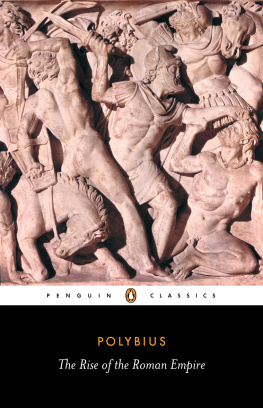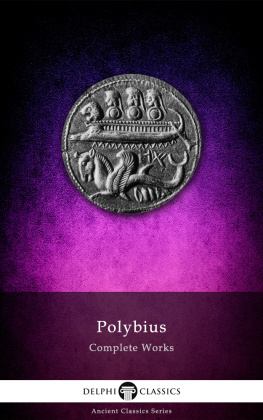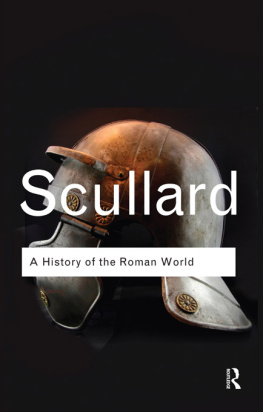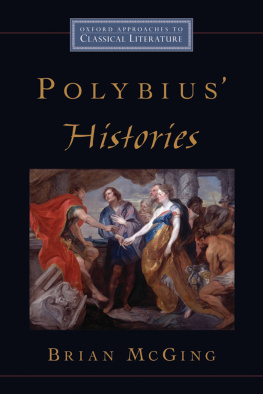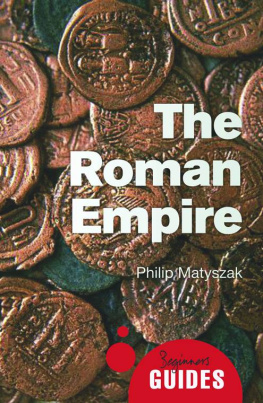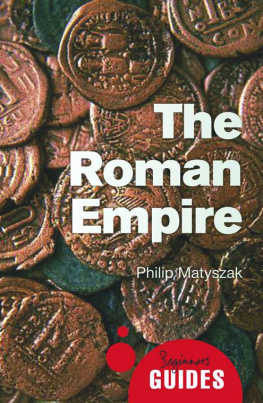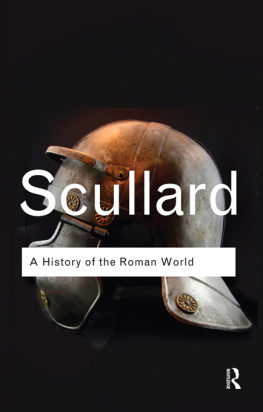Polybius - The Rise of the Roman Empire
Here you can read online Polybius - The Rise of the Roman Empire full text of the book (entire story) in english for free. Download pdf and epub, get meaning, cover and reviews about this ebook. year: 1979, publisher: Penguin, genre: Art. Description of the work, (preface) as well as reviews are available. Best literature library LitArk.com created for fans of good reading and offers a wide selection of genres:
Romance novel
Science fiction
Adventure
Detective
Science
History
Home and family
Prose
Art
Politics
Computer
Non-fiction
Religion
Business
Children
Humor
Choose a favorite category and find really read worthwhile books. Enjoy immersion in the world of imagination, feel the emotions of the characters or learn something new for yourself, make an fascinating discovery.
- Book:The Rise of the Roman Empire
- Author:
- Publisher:Penguin
- Genre:
- Year:1979
- Rating:4 / 5
- Favourites:Add to favourites
- Your mark:
- 80
- 1
- 2
- 3
- 4
- 5
The Rise of the Roman Empire: summary, description and annotation
We offer to read an annotation, description, summary or preface (depends on what the author of the book "The Rise of the Roman Empire" wrote himself). If you haven't found the necessary information about the book — write in the comments, we will try to find it.
The Rise of the Roman Empire — read online for free the complete book (whole text) full work
Below is the text of the book, divided by pages. System saving the place of the last page read, allows you to conveniently read the book "The Rise of the Roman Empire" online for free, without having to search again every time where you left off. Put a bookmark, and you can go to the page where you finished reading at any time.
Font size:
Interval:
Bookmark:

THE RISE OF THE ROMAN EMPIRE
ADVISORY EDITOR: BETTY RADICE
The Greek statesman and historian POLYBIUS (C. 200-118 B.C.)played a prominent part in the Achaean League, which strove to maintain a friendly but independent policy towards the Romans. After the defeat of Macedon in168 B.C., Polybius was removed to Rome for indefinite detention on political grounds. There he met Scipio Aemilianus, a son of the conqueror of Macedon, and became the young mans friend and adviser. This gave Polybius entry to the aristocratic Sdpienic circle and the freedom of movement to visit Africa, Spain and Gaul. In 150 B.C. his detention ended and he returned to Greece, but he remained closely associated with Scipio and accompanied him to Carthage in the Third Punic War.
Polybius drew upon a variety of written and oral sources which are no longer identifiable, as well as employing documentary evidence, such as the treaties between Rome and Carthage. His aim was partly to assess the achievement of die Roman domination and partly to write a history of practical benefit to future statesmen. For the latter purpose he insisted that die historian must himself have participated in war and politics at first hand. As a work of scientific history, written by a man of great intelligence who commanded a wide experience of political and military affairs, and who is largely free from national prejudices and dedicated to the search for truth, it is of inestimable value.
FRANK W. WALBANK was educated at Bradford Grammar School and Peterhouse, Cambridge, where he is now an Honorary Fellow. He is a past President of the Classical Association and of the Roman Society, and a Fellow of the British Academy. He was successively Professor of Latin and of Ancient History and Classical Archaeology in the University of Liverpool for thirty-one years. His published works include The Awful Revolution (1969), Polybius (1972), A Historical Commentary on Polybius (three volumes; 1957,1967 and 1979), The Hellenistic World (1981), Selected Papers (1985) and numerous articles and reviews.
IAN SCOTT-KILVERT studied Classics at Harrow and Caius College, Cambridge, and was General Editor of the Writers and Their Work series for the British Council. He translated Plutarchs The Rise and Fall of Athens, Makers of Rome: Nine Lives and The Age of Alexander for the Penguin Classics. He died in1989.
THE RISE OF THE ROMAN EMPIRE
* * *
TRANSLATED BY IAN SCOTT-KILVERT
SELECTED WITH AN INTRODUCTION BY
F. W. WALBANK
*

PENGUIN BOOKS
PENGUIN BOOKS
Published by the Penguin Group
Penguin Books Ltd, 80 Strand, London WC2R 0RL, England
Penguin Putnam Inc., 375 Hudson Street, New York, New York 10014, USA
Penguin Books Australia Ltd, 250 Camberwell Road, Camberwell, Victoria 3124, Australia
Penguin Books Canada Ltd, 10 Alcorn Avenue, Toronto, Ontario, Canada M4V 3B2
Penguin Books India (P) Ltd, 11 Community Centre, Panchsheel Park, New Delhi 110 017, India
Penguin Books (NZ) Ltd, Cnr Rosedale and Airborne Roads, Albany, Auckland, New Zealand
Penguin Books (South Africa) (Pty) Ltd, 24 Sturdee Avenue, Rosebank 2196, South Africa
Penguin Books Ltd, Registered Offices: 80 Strand, London WC2R 0RL, England
www.penguin.com
First published 1979
32
Translation copyright Ian Scott-Kilvert, 1979
Introduction copyright Frank W. Walbank, 1979
All rights reserved
Except in the United States of America, this book is sold subject to the condition that it shall not, by way of trade or otherwise, be lent, re-sold, hired out, or otherwise circulated without the publishers prior consent in any form of binding or cover other than that in which it is published and without a similar condition including this condition being imposed on the subsequent purchaser
Introduction; The First Punic War
Affairs in Spain; The Romans in Illyria; Affairs in Spain; Rome and the Gauls; Affairs in Spain; Events in Greece: the Achaean League
Introduction; The Second Punic War; The Second Illyrian War; The Second Punic War; The Second Illyrian War; The Second Punic War
Affairs in Greece: Civil War in Cynaetha; Byzantium and the Black Sea
Affairs in Egypt: The Death of Cleomenes; Affairs in Greece: Philip and the Greeks
From the Preface; On the Forms of States; On the Roman Constitution at Its Prime; The Roman Military System; The Roman Republic Compared with Others; Conclusion
Affairs in Sicily; Affairs in Greece: The Treaty between Hannibal and Philip of Macedon, The Character of Philip
Affairs in Sicily: The Siege of Syracuse; Affairs in Greece: Philip of Macedon; Affairs in Italy: The Siege of Tarentum
, Lack of Political and Military Experience and Unwillingness to Travel, The Causes of Timaeus Faults and the Qualities of the Good Historian
Affairs in Africa: Scipios Campaigns
Affairs in Africa: The Final Campaign; The End of the Second Punic War; Affairs in Macedonia, Syria and Egypt; Affairs in Egypt: A Palace Revolution
Affairs in Greece: Flamininus and Philip; On Treachery; On the Phalanx; Affairs in Greece: Flamininus and the Peace Settlement
Affairs in Greece: Philopoemen and Aristaenus
Affairs in Rome and Syria: The Escape of Demetrius; Affairs in Italy: Aemilius Paullus, Scipio and Polybius
Affairs in Rome and Carthage: The Third Punic War; On Fate and Chance
From the Epilogue
The conquest of the largely Greek eastern Mediterranean was a major step in Romes rise to world power. The decisive years were from 200to 167 B.C., and we owe our knowledge of them to the Greek historian Polybius. His own lifetime overlapped part of the period, and it was his fortune to be brought into intimate contact with some of the most influential Romans. For contemporary Greeks the impact of Rome was a terrifying and disheartening experience, fraught with problems. Even after the predominance of Rome was no longer in doubt, not everyone fully understood the harsh realities of the new relationship. It was therefore primarily to elucidate to his fellow-countrymen that invincible combination of manpower, military skill and might, intimidating toughness in adversity and moral scrupulousness (sometimes compounded with self-deception) which formed the basis of Roman domination, that Polybius composed his Histories. Such knowledge, he hoped, would help them to cope with the political problems of a world in which they now had to learn to live with their Roman masters.
In its final form his work covered the years from 264 to 146 B.C.At the beginning of this period the Hellenistic system of sovereign states was still intact, roughly in the shape in which it had emerged from the struggles which followed the death in 323 B.C. of Alexander the Great of Macedonia, who had conquered the east from Greece to India. There were three major monarchies, in Macedonia, Syria and Egypt. Macedonia was ruled by a native dynasty, the Antig-onids. Monarchy in Macedonia was less absolute than elsewhere, and retained several primitive features. Macedonian nobles prided themselves on their tradition of speaking and behaving with frankness towards their King. Elsewhere, Macedonian Kings ruled over conquered populations of a different stock. In Egypt Alexanders general, Ptolemy, had seized the lands and throne of the Pharaohs.
Font size:
Interval:
Bookmark:
Similar books «The Rise of the Roman Empire»
Look at similar books to The Rise of the Roman Empire. We have selected literature similar in name and meaning in the hope of providing readers with more options to find new, interesting, not yet read works.
Discussion, reviews of the book The Rise of the Roman Empire and just readers' own opinions. Leave your comments, write what you think about the work, its meaning or the main characters. Specify what exactly you liked and what you didn't like, and why you think so.

